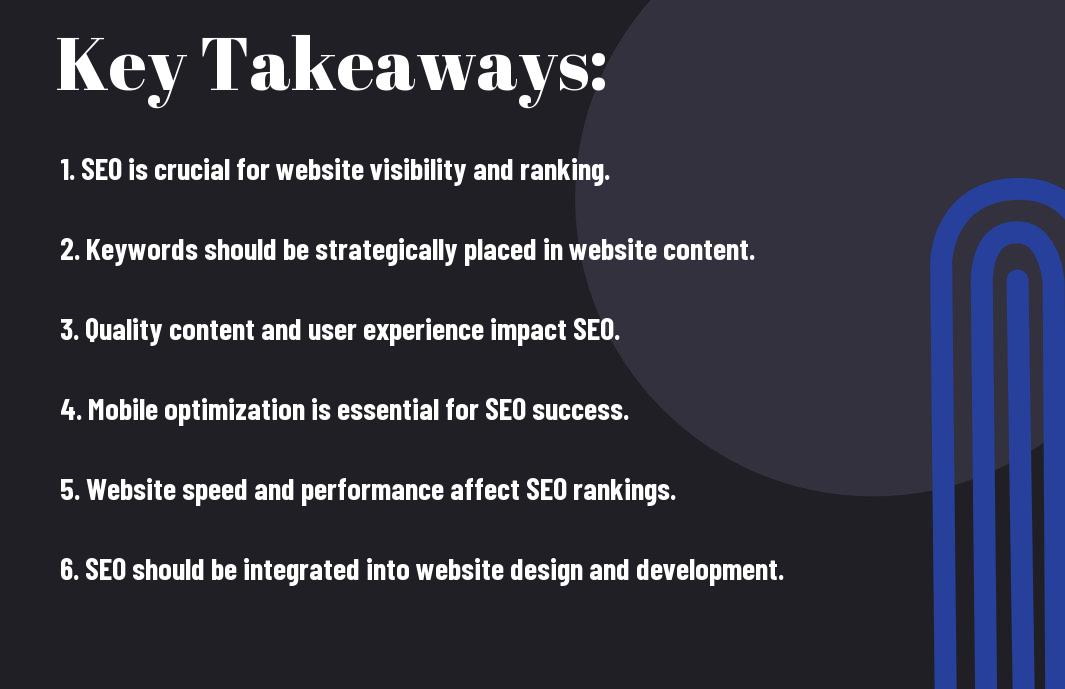Have you ever wondered about the significance of SEO in creating and building your website? It’s not a secret that today’s digital world is saturated with websites, so ensuring that your website stands out is critical for success. This is where SEO comes in. By incorporating SEO strategies and principles into your website design and development, you can dramatically increase your website’s visibility and traffic. Imagine being able to rank higher on search engine results and increase your organic traffic without having to pay for advertisements. In this blog post, we’ll delve into the role of SEO in website design and development, and provide you with valuable insights and actionable tips to help you optimize your website for better performance.
Key Takeaways:
- Optimizing your website for search engines is crucial for improving visibility and driving organic traffic.
- Integrating SEO elements into website design and development can lead to a more user-friendly and accessible site.
- Effective SEO strategies involve keyword research, metadata optimization, and mobile responsiveness for better rankings.
- Collaboration between web designers and SEO specialists is essential for creating a well-optimized and high-performing website.
- Consistent monitoring and adaptation of SEO strategies are necessary to keep up with search engine algorithm updates and changing user behavior.

SEO Fundamentals
While designing and developing your website, it is crucial to prioritize search engine optimization (SEO) to ensure that your site is easily discoverable by your target audience. By understanding the fundamentals of SEO, you can effectively enhance your website’s visibility and drive organic traffic. To dive deeper into this topic, you can check out this insightful article on the Power of SEO in Web Design and Development.
Understanding Search Engine Algorithms
Search engine algorithms are constantly evolving, impacting how websites are ranked in search results. By staying updated with the latest algorithm changes and understanding the key ranking factors, you can optimize your website to improve its visibility. Factors such as content quality, mobile-friendliness, and site speed play crucial roles in determining your website’s search engine ranking.
Keyword Research and Selection
Conducting thorough keyword research is essential for identifying the search terms that your target audience is using. By selecting the right keywords, you can attract relevant traffic to your website and improve your chances of ranking higher in search results. Long-tail keywords and low-competition keywords can be particularly effective in driving quality traffic to your site.
On-page SEO Elements
On-page SEO elements, such as meta titles, meta descriptions, and header tags, play a significant role in conveying the relevance of your content to search engines. By optimizing these elements, you can improve your website’s visibility and make it more appealing to both search engines and your visitors. Additionally, proper URL structures and internal linking can further enhance the SEO performance of your website.
SEO in Web Design
After you have conducted thorough keyword research and developed an SEO strategy for your website, the next step is to integrate these tactics into the web design process. It’s essential to understand that SEO is not just about optimizing content and meta tags; it also plays a crucial role in the overall design and development of your website. To dive deeper into this topic, you can check out this insightful article on The Role Of SEO In Web Development: Best Practices for …
Responsive Design and Mobile Optimization
When it comes to web design, ensuring that your website is responsive and optimized for mobile devices is crucial for both user experience and SEO. Google prioritizes mobile-friendly websites in its search rankings, so if your site is not optimized for mobile, you could be missing out on valuable traffic and potential customers. With the increasing number of people using mobile devices to access the internet, having a responsive design is no longer just an option – it’s a necessity.
Site Architecture and Navigation
Proper site architecture and navigation are not only important for user experience but also for search engine crawlers. An organized and easy-to-navigate website structure makes it easier for search engines to crawl and index your content. This, in turn, can positively impact your site’s visibility in search results. By creating clear pathways for users and search engine bots to navigate your site, you can improve the overall SEO performance of your website.
SEO-Friendly Content and Multimedia
When designing your website, it’s important to ensure that your content is not only engaging and relevant but also optimized for search engines. This includes using relevant keywords, creating high-quality multimedia content, and structuring your content in a way that is easily digestible for both users and search engines. Including relevant keywords in your headings, meta descriptions, and image alt text can help improve the visibility of your website in search results.
Technical Aspects of SEO
Despite the importance of high-quality content and effective keyword targeting, the technical aspects of SEO play a crucial role in determining the success of your website. By optimizing these technical elements, you can enhance the overall performance and visibility of your site in search engine results.
Website Speed and Performance Optimization
When it comes to SEO, the speed and performance of your website are critical factors. A slow-loading site can significantly impact your search rankings and user experience. With Google now using site speed as a ranking factor, optimizing your website for speed is not only beneficial for SEO but also for retaining visitors. By compressing images, minifying CSS and JavaScript files, and leveraging browser caching, you can improve your website’s performance and ensure a seamless user experience.
Structured Data and Schema Markup
Adding structured data and schema markup to your website’s code is essential for helping search engines understand the content on your site. This not only improves the way your site is displayed in search results but also enhances the relevance and visibility of your content. By implementing structured data, you can provide search engines with additional context about your website, helping them better understand and categorize your content.
Security and HTTPS
In today’s digital landscape, security is a top priority for both users and search engines. Implementing HTTPS encryption on your website not only protects the integrity of your data but also provides a ranking boost in search results. By securing your site with HTTPS, you can assure your visitors that their information is safe and create a more trustworthy online environment. Furthermore, Google has explicitly stated that sites with HTTPS will be prioritized in search rankings, making it an essential technical aspect of SEO.
By optimizing the technical aspects of your website, you can improve its performance, security, and visibility in search engine results. This, in turn, will enhance the overall user experience and drive more traffic to your site. It is important to stay informed about the latest technical SEO best practices and regularly audit your website to ensure it meets the necessary requirements for optimal performance.
Monitoring and Maintaining SEO Health
To ensure the ongoing success of your website, it’s important to actively monitor and maintain the health of your SEO. This involves regularly assessing the performance of your website, identifying any issues, and implementing necessary updates to keep your SEO strategy on track.
Tools for Tracking SEO Success
There are various tools available to help you track the success of your SEO efforts. Utilizing tools such as Google Analytics, SEMrush, Moz, and Ahrefs can provide valuable insights into your website’s performance, including keyword rankings, traffic sources, and user engagement. These tools give you the data you need to make informed decisions about your SEO strategy and identify areas for improvement.
Regular SEO Audits and Updates
Regular SEO audits are essential for maintaining the health of your website’s SEO. By conducting audits, you can identify any issues that may be affecting your website’s performance, such as broken links, outdated content, or technical errors. It’s important to stay on top of these audits and make necessary updates to ensure that your website remains optimized for search engines.

SEO Strategies and Trends
Not only does your website design and development play a crucial role in the user experience and overall aesthetics of your site, but it also has a significant impact on your search engine optimization (SEO) efforts. By implementing the right SEO strategies and staying up to date with the latest trends, you can ensure that your website not only looks great but also performs well in search engine results pages (SERPs).
When it comes to incorporating SEO into web design, it’s essential to understand the critical role that website design plays in your overall SEO strategy. You can learn more about this by reading The Role of Web Design in Your SEO and how it impacts your site’s search engine performance.
The Role of Artificial Intelligence in SEO
Artificial Intelligence (AI) is transforming the way search engines process and analyze content. With AI, search engines can now better understand the context, intent, and relevance of web pages, which ultimately impacts your site’s SEO performance. AI also powers features like voice search, personalized search results, and more efficient data processing, making it crucial for your SEO strategy to incorporate AI-driven elements to stay competitive.
Voice Search and the Next Generation of SEO
As technology evolves, so do search behaviors. With the rise of voice-activated devices and smart assistants, voice search is becoming increasingly popular. This trend has significant implications for SEO, as users tend to use conversational and long-tail keywords when conducting voice searches. Optimizing your website for voice search by incorporating natural language and conversational phrases can help you stay ahead in the next generation of SEO.
Conclusion: The Role of SEO in Website Design and Development
Taking this into account, it is clear that incorporating SEO into your website design and development is crucial for improving your online visibility and driving organic traffic to your site. By optimizing your website for search engines, you can ensure that your content is easily discoverable and ranks higher in search results. This not only enhances the user experience but also increases the likelihood of converting visitors into customers. Additionally, SEO-friendly design and development practices can help you stay ahead of your competitors and establish a strong online presence. Therefore, it is imperative to prioritize SEO in every stage of creating and maintaining your website in order to achieve long-term success in the digital landscape.
FAQ
Q: What is the role of SEO in website design and development?
A: The role of SEO in website design and development is to ensure that the website is optimized for search engines, making it easier for users to find and improving its visibility in search engine results pages.
Q: Why is SEO important in website design and development?
A: SEO is important in website design and development because it helps drive organic traffic to the website, increases its visibility, and improves user experience, ultimately leading to better conversion rates and business success.
Q: What are some SEO elements that need to be considered in website design and development?
A: Some SEO elements to consider in website design and development include keyword research and optimization, website structure and navigation, optimized content creation, mobile-friendliness, site speed, and user experience.
Q: How can SEO be integrated into website design and development?
A: SEO can be integrated into website design and development by collaborating with SEO professionals from the beginning, conducting thorough keyword research, creating optimized content and metadata, implementing technical SEO best practices, and continuously monitoring and improving SEO performance.
Q: What are the benefits of integrating SEO into website design and development?
A: The benefits of integrating SEO into website design and development include higher search engine rankings, increased organic traffic, improved user experience, better conversion rates, and ultimately, a more successful and profitable website. By prioritizing SEO, websites can reach their full potential and attract the right audience.
